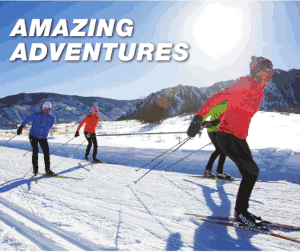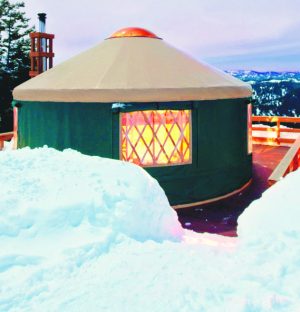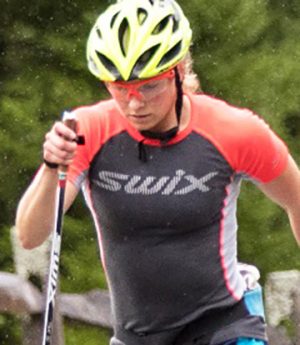July 06, 2015 – The CCC Women’s Committee hosted a panel for 14-19 year old girls as part of the Fast and Female event at the Ski Nationals this year. 40 girls participated in the panel. The topic of conversation was how to effectively balance university education with racing and training at a high level. The goal of the panel was to share information between high-school aged girls and women currently training at a high level while also attending university. Jen Tomlinson, from the CCC Board Education Committee, was present to observe and bring feedback back to that Committee.
The panel consisted of six top female racers who are balancing school and ski racing in various ways:
1) Heidi Widmer: Athabasca University (Part time, correspondence)
– AWCA member, Sochi Olympian
2) Kendra Murray: Carleton University (full time)
– Carleton ski team, Yukon Ski Team, Bronze at Canada Games 2015
3) Kajsa Heyes: Nippissing University (full time); formerly at Quest University
– Nippissing ski team, Former Callaghan Training Centre athlete
4) Alannah McLean: Lakehead University (full time)
– Thunder Bay NDC
5) Andrea Lee: Michigan Tech – Graduate studies (NCAA)
– Formerly Thunder Bay NDC
– Graduate of Lakehead University
6) Frederique Vezina: CEGEP/Laval University
– Centre National d’Entrainement Pierre Harvey
The discussion began with panelists explaining why it was important for them to go to school while still skiing at a high level. The answers varied in their details, but three common threads emerged. First, all six women described the importance of exercising the brain as well as the body. All the panelists also cited a need for an outlet outside of skiing to create balance in their lives. Frederique stated, “I would be bored without school and hyperactive without skiing!”
One of the participants then asked whether the panelists felt their grades suffered because of their training. The answer was “yes, a bit,” but that there is a lot to be gained from doing both, not the least of which is developing great discipline. The participants were advised that one has to let go a bit about grades (note, however, that all the panelists are still top students), especially around busy training and racing times. They were also advised that you have to let go of ski performance a bit around busy times at school. Again, the message was that the balance achieved is worth it.
Another participant asked how Andrea Lee found the difference between the Canadian university system and the NCAA. She advised that the NCAA offers very high quality racing, often higher quality than the NorAm circuit, and that there is money available to pay for both skiing and school. Her experience with the NCAA has been very positive.
The panelists were then asked what pressures they faced to quite skiing for school. Most cited the opposite pressure as the predominant problem – pressure not to go to school was very strong. Some experienced pressure from parents or other community members to go straight in to full time school. The common thread amongst all the panelists was that they had a strong desire to both ski and go to school, and a willingness to fight to do both. Most of the panelists were nearing the end of their university careers and were exceptionally positive about their experience balancing school and skiing.
At this point, a participant asked whether the panelists felt that they, as top students, had sacrificed the opportunity to attend a “top” school. The answer was a unanimous no. All the participants felt that the smaller schools they attend offer more flexibility to ski, and have more engaged professors who are willing to work with students on an individual level. Further, they all strongly feel that the “hype about schools” doesn’t mean anything about the quality of education.
Another participant asked whether the panelists felt they missed out on the “normal university stuff”. Again, the answer was a unanimous no. The panelists were universal in feeling that the “normal university stuff” is not that great. In addition, as skiers, our lifestyle is different from other students so some normal things, like living in residence, can be quite negative experiences. In the end, the skiers do “normal” stuff with their skiing friends.
The panel wrapped up at this point and we all headed out for a relaxed recovery jog. Many participants took this opportunity to ask more individual questions of the panelists. All in all, the feedback was fantastic. The participants were engaged and every panelist had positive and interesting information to give!






![National camp action [P]...](https://skitrax.com/wp-content/uploads/2019/08/Duluth-4-2019-08-08-at-10.46.51-AM-300x246.png)
![Matt Liebsch on the CXC Elite Team [P] CXC...](https://skitrax.com/wp-content/uploads/2019/08/Matt-Liebsch-CXC.2-525x700.4-300x267.jpg)
![Dan LaBlanc [P]...](https://skitrax.com/wp-content/uploads/2019/08/Dan-LaBlanc-img_1855.3.jpg)

![Fast and Female Athletes Panel [P] CCC](http://skitrax.com/wp-content/uploads/2015/07/Fast-and-Female-Athletes-Panel-P-CCC.jpg)